外研社Module 9 animals in danger
- 格式:ppt
- 大小:11.06 MB
- 文档页数:24
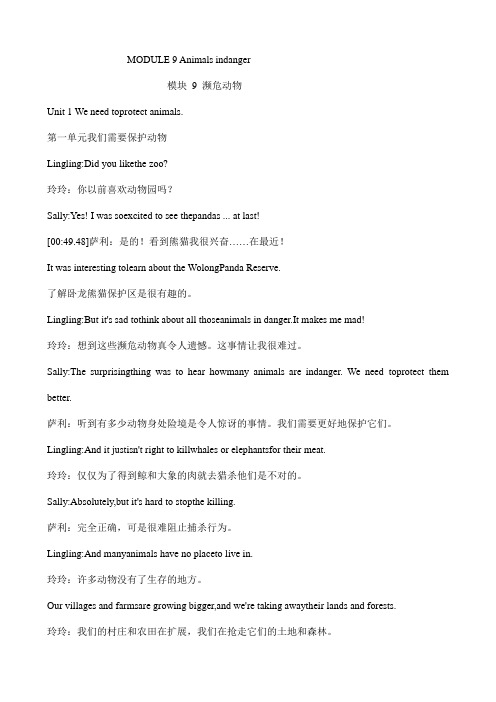
MODULE 9 Animals indanger模块9 濒危动物Unit 1 We need toprotect animals.第一单元我们需要保护动物Lingling:Did you likethe zoo?玲玲:你以前喜欢动物园吗?Sally:Yes! I was soexcited to see thepandas ... at last![00:49.48]萨利:是的!看到熊猫我很兴奋……在最近!It was interesting tolearn about the WolongPanda Reserve.了解卧龙熊猫保护区是很有趣的。
Lingling:But it's sad tothink about all thoseanimals in danger.It makes me mad!玲玲:想到这些濒危动物真令人遗憾。
这事情让我很难过。
Sally:The surprisingthing was to hear howmany animals are indanger. We need toprotect them better.萨利:听到有多少动物身处险境是令人惊讶的事情。
我们需要更好地保护它们。
Lingling:And it justisn't right to killwhales or elephantsfor their meat.玲玲:仅仅为了得到鲸和大象的肉就去猎杀他们是不对的。
Sally:Absolutely,but it's hard to stopthe killing.萨利:完全正确,可是很难阻止捕杀行为。
Lingling:And manyanimals have no placeto live in.玲玲:许多动物没有了生存的地方。
Our villages and farmsare growing bigger,and we're taking awaytheir lands and forests.玲玲:我们的村庄和农田在扩展,我们在抢走它们的土地和森林。

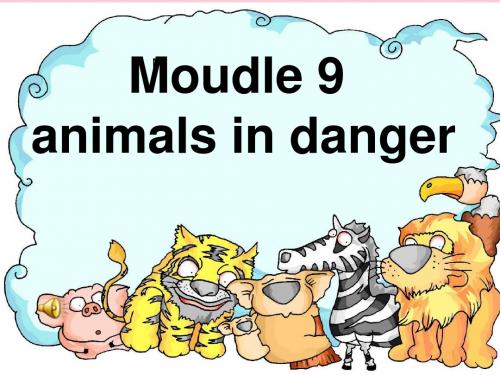
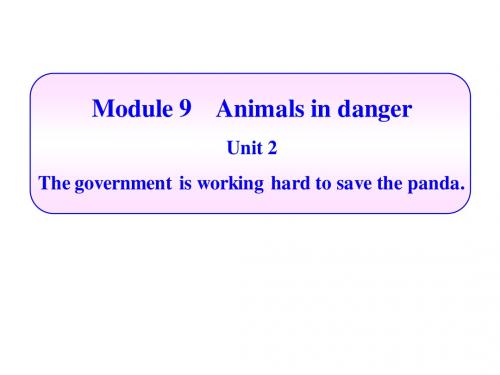
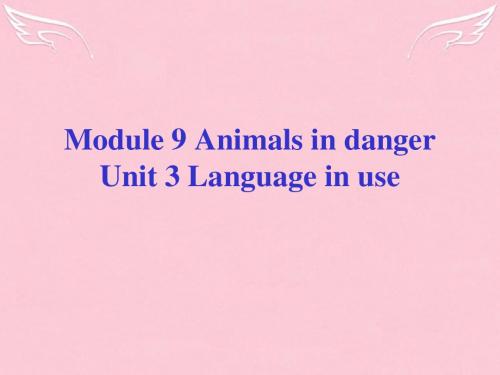
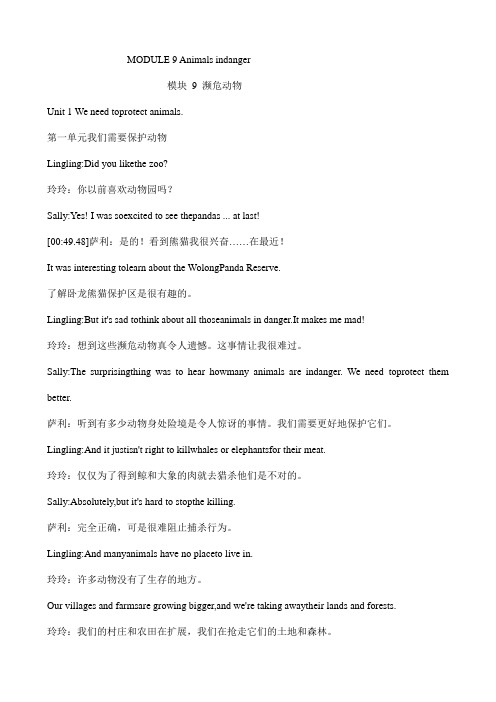
MODULE 9 Animals indanger模块9 濒危动物Unit 1 We need toprotect animals.第一单元我们需要保护动物Lingling:Did you likethe zoo?玲玲:你以前喜欢动物园吗?Sally:Yes! I was soexcited to see thepandas ... at last![00:49.48]萨利:是的!看到熊猫我很兴奋……在最近!It was interesting tolearn about the WolongPanda Reserve.了解卧龙熊猫保护区是很有趣的。
Lingling:But it's sad tothink about all thoseanimals in danger.It makes me mad!玲玲:想到这些濒危动物真令人遗憾。
这事情让我很难过。
Sally:The surprisingthing was to hear howmany animals are indanger. We need toprotect them better.萨利:听到有多少动物身处险境是令人惊讶的事情。
我们需要更好地保护它们。
Lingling:And it justisn't right to killwhales or elephantsfor their meat.玲玲:仅仅为了得到鲸和大象的肉就去猎杀他们是不对的。
Sally:Absolutely,but it's hard to stopthe killing.萨利:完全正确,可是很难阻止捕杀行为。
Lingling:And manyanimals have no placeto live in.玲玲:许多动物没有了生存的地方。
Our villages and farmsare growing bigger,and we're taking awaytheir lands and forests.玲玲:我们的村庄和农田在扩展,我们在抢走它们的土地和森林。
Module9 Unit1复习资料1.需要need to d o sth. /need +n. / pron.2. protect sb. / sth. 保护,防护某人/某物protect sth.from sth. / doing sth. 保护sth. 免受sth.的伤害5. live in +地方住在……里9. 有with (doing) sth. ; 没有without (doing) sth10. Which animals … 哪种动物……11. talk about sth. 谈论关于……12. in danger处于危险中13. Sb. be excited to do sth. 做某事是激动的.14. at last最后=finally=at the end15. know about 了解16. think about 考虑17. make sb. mad使某人感到极度激动的make sb. do sth. 使某人做某事make sb. adj.使某人变得怎么样18. It's hard to do sth. 做某事是难的.21. grow bigger发展得更大停止某事stop sth. 停止做某事stop doing sth. 停下来去做某事stop to do sth.19. have no place to live in.没有地方生活.20. The surprising thing 令人惊讶的事情.surprising 修饰物; ,surprised 修饰人22. take away带走,拿走24. Sth. isn't good to do sth. 某物是不适宜做某事的25. really awful.真的令人讨厌.reall y 放于行为动词,形容词,定冠词前26. live in peace住在安宁中27. 决定(不)做某事decide (not ) to do sth.28. on earth到底29. find out 找出, 发现33. become rare变得稀少30. Wha t is the matter with sb. =What is wrong with sb. 某人出什么事了31. too … to… 太……而不能……32. too many animals太多动物too many+可数名词复数太多too much + 不可数名词34.examples of sth. …例子for example 例如= such as36. I am sad / happy / sorry /to do sth.做某事令我感到悲伤/高兴/抱歉/惊奇的.Module9 Unit 2复习资料1.努力工作work hard2. one of the animals most in danger.最危险的动物之一.One of +可数名词复数:某物之一, 表单数后接动词单数3. about 1,000大约一千4. nature reserve自然保护区5. zoos and research centres动物园研究中心6. look after照顾=take care of7. Southwest China中国西南地区8. live on 以……为食/ 生9. each +名词后接动词第三人称单数形式每个……11. become smaller变得更少12. different reasons不同原因13. less and less 接不可数名词fewer and fewer接可数名词more and more 越来越多形容词的比较级+and+比较级:越来越……15. more than超过,多于=over22. in the world在世界上16. enough food足够的食物enough放于名词前,放于形容词后big enough17. make a new plan 制定一个新计划18. grow better生长得更好19. go back回去20. mos t people大多数人21. one of + 最高级+名词one of ……之一其中最…的某物之一24. still a long way to do sth. 做某事仍需走很长的路.a long way to go 路还很长,还需要努力25. think of 想想,认为;后接动词ing形式,或名词26. such as例如=for example, for instance27. try to do sth.努力做某事28. make sure+句子保证……Module9 Unit 3复习资料动词不定式由"to+动词原形"构成,否定形式是"not + to+ 动词原形",1. It is / was + adj.形容词+ to do sth.做某事是怎么样的.2. We / They /are,were +adj. 形容词+ to do sth. 做某事令我们感到怎么样.3. He / She +is a dj. 形容词+ to do sth.4. want to do sth.想做某事.5. It is nice of you to do sth.做某事对你来说是好的.6. invite sb. to do sth.邀请某人去做某事7. What time … 什么时候,几点…….8.h alf past four4点半9.let sb. do sth.让某人做某事.10. make sb. do sth.使某人做某事.11. make sb. + adj.使某人变得……12.show sb. sth.=show sth. to sb.展示, 出示……13. stop doing sth.停止做某事14. s top to do sth.停下来去做某事15. tell sb. sth.=tell sth. to sb.告诉……16. tell sb. (not) to do sth.告诉某人做某事17. design a poster 设计一份海报18. endangered animals濒危动物19. make jewellery 制造珠宝20. provide sth. for sb. 向某人提供……21.保持:keep sth. + adj.保持某物怎么样keep doing sth.保持做某事22. pollute rivers污染河流23. cut down 砍下24.surprised, interested, excited用于修饰人;I am excited about the panda reserves.surprising, interesting, exciting用于修饰物The book is interesting.25. the cause of sth. 某物的原因。
一、课题Module9 Animals in danger Unit1 We need to protect animals.二、教材:外研社八年级下三、PurPose:1.To understand conversation about animals in danger.2.To listen for specific words.3.To learn new words.4.To get some information from the listening ma terials and reading.5.To teach students to protect animals.四、Skills: listening and reading1.To understand what the conversation is about.2.To grasp the key words and key structures.3.To talk about what animals are in danger and how to protect them.五、Level: ordinary六、Materials: Tape reorder; handout; OHP; video; multimedia.七、Participants; All the students.八、Evaluation: Evaluate and encourage students after their group work.九、Variation: base on the real situation in class, Add or cut some procedures or change some procedures in order.十、Diffcult points:1.To talk about what animals are in danger and how to protect them.2.To learn the use of infinitive.十一、Teaching procedure.Step1.Reviseon.1.greetings.2.Ask students to revise some animals in English (bear; camel; elephant; lion; snake; ti ger; whale; cow; duck; goose; chicken; horse; bird)Step2.presentation.1.Show the pictures and some quizs on the screen of the computer .Ask the students to fi ll in the blanks.Quiz: ①I am orange and black .②I am the tigers ‘cousin .③I am brown or block and I live in the forest .④I am very big and I live in the sea .⑤I am long and thin .⑥I am big and I have a very long hose .⑦I can walk a long way without drinking ..Step3. Work in pairs.Let s tudents fill in the quiz in pairs.Step4. Listening.1. Show the new words and key words on the computer (danger; protect; orange; cousin; br own; mad; killing; hard; take away; dirty; awful; peace; find out;)2. let students read them together.3. Then do listening exercise .Answer the following questions.①which animals are they talking about?②which animals are in danger?Step5. listen and read.1.liseen to the tape and read after it.2. Read the conversation by themselves and try to answer these following questions. Then check the answers.①when do you think this conversation happens?②Has Sally ever seen the pandas before?③why do people kill whales or elephants?④what happens when the villages and farms grow bigger?⑤who has made the water too dirty to drink?3.work in groups of four.①Try to understand the meaning of the dialogue.②Underline the key expressions and pay attention to the infinitive.4.Ask students to read the coversation carefully and do EX5 on Page765.Teacher will explain some uses of the infinitive.6.Read the conversation again.Step6. Free talk ;Work in Pairs.1.why do some animals have no place to live in?2.Do you think it is right to kill animals for their meat?3.would you like to find out more about animals in dangle?4.Give us some suggestions about how to protect animalsHome work:一、选出正确答案。
初中英语考点剖析与典题精讲系列三点剖析单词·典句·考点danger []n. 危险【经典例句】In war,life is full of danger for everyone.在战争中,每个人的生活都危机四伏。
【考点聚焦】1) 派生词:dangerous adj. 危险的;反义词:safety n. 安全,safe adj. 安全的。
2)常见搭配:in danger在……危险之中;out of danger脱离危险【活学活用】1.用danger的适当形式填空1)Be careful,it’s too .2)He always helps people in .答案:1)dangerous2)dangerprotect []v. 保护【经典例句】He raised his arm to protect his face.他举起手臂护住脸部。
【考点聚焦】1)派生词:protection n. 保护2)常见搭配:protect...from/against...防止……遭受……;使……免于,保护……使……不受……【活学活用】2.选择填空We should (stop/protect) the trees from sand.答案:protectMainly[]adv.主要地,大体地【经典例句】This school is mainly for boys.There are only a few girls in it.这所学校主要招收男孩,女孩很少。
【考点聚焦】1)派生词:main adj. 主要的;mainly用于be动词前、助动词、情态动词之后,实义动词之前。
2)同义词辨析:mainly 强调从重要性上来划分,和次要对应,如:He mainly learns Chinese here.他来这儿主要为学汉语。
mostly强调从数量上划分,与少数对应,如:The people in the street were mostly tourists.街上的人大部分是游客。